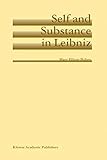Self and Substance in Leibniz / by Marc Elliott Bobro.
Tipo de material: TextoEditor: Dordrecht : Springer Netherlands, 2005Descripción: vii, 144 páginas recurso en líneaTipo de contenido:
TextoEditor: Dordrecht : Springer Netherlands, 2005Descripción: vii, 144 páginas recurso en líneaTipo de contenido: - texto
- computadora
- recurso en línea
- 9781402025822
- BD95-131
Springer eBooks
Am I Essentially a Person? -- What Makes Me a Person? -- What Makes Me The Same Person? -- Could Thinking Machines Be Moral Agents? -- Why Bodies? -- What Makes My Survival Meaningful?.
We are omniscient but confused, says Leibniz. He also says that we live in the best of all possible worlds, yet do not causally interact. So what are we? Leibniz is known for many things, including the ideality of space and time, calculus, plans for a universal language, theodicy, and ecumenism. But he is not known for his ideas on the self and personal identity. This book shows that Leibniz offers an original, internally coherent theory of personal identity, a theory that stands on its own even next to Locke's contemporaneous and more famous version. This book will appeal not only to students of Leibniz's thought but also to philosophers and psychologists interested in methodological problems in understanding or formulating theories of self and personal identity.
Para consulta fuera de la UANL se requiere clave de acceso remoto.


